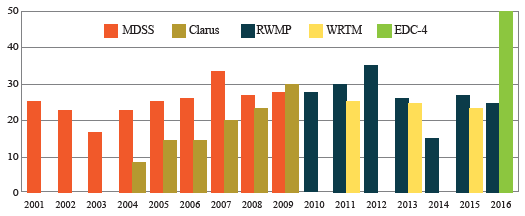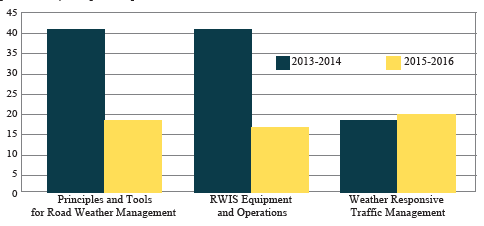2017 Road Weather Management Performance Measures UpdateChapter 4. Road Weather Management Capacity BuildingOVERVIEWCapacity building refers to providing stakeholders with flexible, accessible learning, and growth through training, technical assistance, and educational resources. When applied to road weather management, it includes activities and products that improve the performance of weather-related actions. This includes participation in various stakeholder meetings, road weather research and development (R&D) projects, training programs, conferences, and webinars. The goal of capacity building is to improve individual as well as organizational capacities for addressing and overcoming road weather problems. PERFORMANCE FINDINGSParticipation in Road Weather Management Meetings and Community of Practice Participation in road weather management (RWM) meetings has shown a consistent and strong response, as seen in Figure 19. Stakeholder meetings began with a focus on maintenance decision support systems (MDSS) and Clarus, but starting in 2010, they shifted to focus more broadly on RWM. Since 2011, stakeholders have met to discuss weather responsive traffic management (WRTM) on a biennial basis.  EDC = Every Day Counts. RWMP = Road Weather Management Program. MDSS = Maintenance Decision Support System. WRTM = Weather Responsive Traffic Management Figure 19. Graph. States participating in road weather management meetings. The number of State departments of transportation (DOT) attending the Road Weather Management Program (RWMP) meetings has increased from only 7 in 2014 to about half of the States in 2015 (27) and 2016 (24). The WRTM meeting in 2015 attracted 23 State DOTs. Since 2013, attendance to the WRTM meetings has been limited due to budget restrictions for sponsored travel. The Every Day Counts (EDC) Summits held in 2016 were well-attended, with 48 States participating along with the District of Columbia and the U.S. Virgin Islands. These summits were sponsored by the FHWA Center for Accelerating Innovation to promote the EDC- 4 Weather Savvy Roads Initiative. Participation in Capability Maturity Improvement WorkshopsAnother important aspect of capacity building is advancing the institutional capabilities for RWM by State DOTs. The Federal Highway Administration's Capability Maturity Framework workshops and tool help agencies to develop action plans for raising existing RWM capabilities based on an evaluation of the agency's current practices, tools, and infrastructure. The Capability Maturity Framework assessment is a first step towards greater mainstreaming of RWM programs at State DOTs. Ten States have already conducted the capability maturity assessment workshops. Since the framework was developed in 2014, there was no participation to report in the previous period. It is encouraging that 10 States, spanning a diverse range of climates, have already participated in the in-person workshops in just a couple of years. Participation in Road Weather Management Sponsored Training and WebinarsSince 2015, there has been a decline in the number of State agencies participating in courses offered by the Consortium for ITS Training and Education (CITE), as seen in Figure 20. This is expected since the number of RWM practitioners in transportation agencies remains fairly constant. Unless significant hiring takes place in those agencies (both new positions and staff replacements), the pool of potential trainees for these courses will dwindle.  RWIS = Road Weather Information System. Figure 20. Graph. Performance Measure 22 – number of participants attending Road Weather Management Program-related courses held by the Consortium for Intelligent Transportation System Training and Education. Figure 20 includes the participants of both independent-study and instructor-led versions of each of the three courses. While the instructor-led courses take place on fixed dates once or twice a year, the independent-study courses can be taken at the participants' own pace at any time throughout the year; for this reason, each data set is presented more broadly across a time span of 2 years. It is difficult to determine the reason for this drop in attendance without enough long-term data trends, but some evaluations of the courses tended to revolve around a common criticism that the online nature of the courses makes the content and delivery less effective. It is also important to consider that the RWM-related courses offered from year to year may easily change depending on what topics are of pressing concern at a particular time. While some courses may see declines in attendance, others may see increases by corresponding amounts. In other words, it is difficult to gauge the nationwide interest in RWM programs as a whole by looking at only a few specific courses. Furthermore, a decline in "popularity" could simply be due to external factors such as busy work seasons or a re-prioritization of resources, rather than a general lack of interest in a certain topic. For example, while CITE courses saw a decline in attendance for RWMP-related online courses, the number of agencies participating in RWMP Road Weather Regional Roundtables (webinars) increased, as show in Table 2.
Furthermore, a total of 384 participants – representing all 50 State DOTs – took part in the 7 EDC-4 Weather-Savvy Roads (WSR) summit meeting sessions held in Baltimore, Minneapolis, Albany, Austin, Orlando, Portland, and Sacramento during October and November 2016. The attendance at EDC summit meetings was not a metric assessed in the previous iteration of this report due to WSR being a recent initiative by the Federal Highway Administration (FHWA) RWMP in 2016.(15) Road Weather Management Engagement with Stakeholders in Public ConferencesRWM-related workshops and conferences vary and evolve over time and do not necessarily keep the same name, sponsor, location, or topic. For this reason it is not always easy to reach conclusions about RWM capacity building through direct comparisons of specific conferences; furthermore, collection of attendance information is not always consistent and reliable from year to year. One can, however, try to get a general sense of nationwide interest and involvement in various RWM topics by examining a broad array of reported attendance data across multiple years. RWMP representatives (staff and contractors) also provide presentations, briefings, and demonstrations at various meetings, site visits, or venues – extending the program's reach beyond its own activities. This measure indicates the broader presence that RWMP holds in the transportation and weather community. In the 2015-2017 timeframe, RWMP was represented by program staff or support contractors as shown in Table 3. Attendance data was not collected in the previous iteration of this report, examining the 2013-2014 period.
N/A = not available.
15 FHWA, Center for Accelerating Innovation, "EDC News," 10/27/2016. Available at: https://content.govdelivery.com/accounts/USDOTHFL/bulletins/16db06f. [ Return to note 15. ] | |||||||||||||||||||||||||||||||||||||||||||||||||||||||||||||||||||||||||||||||||||||||||||||||||||||||||||||||||||||
|
United States Department of Transportation - Federal Highway Administration |
||